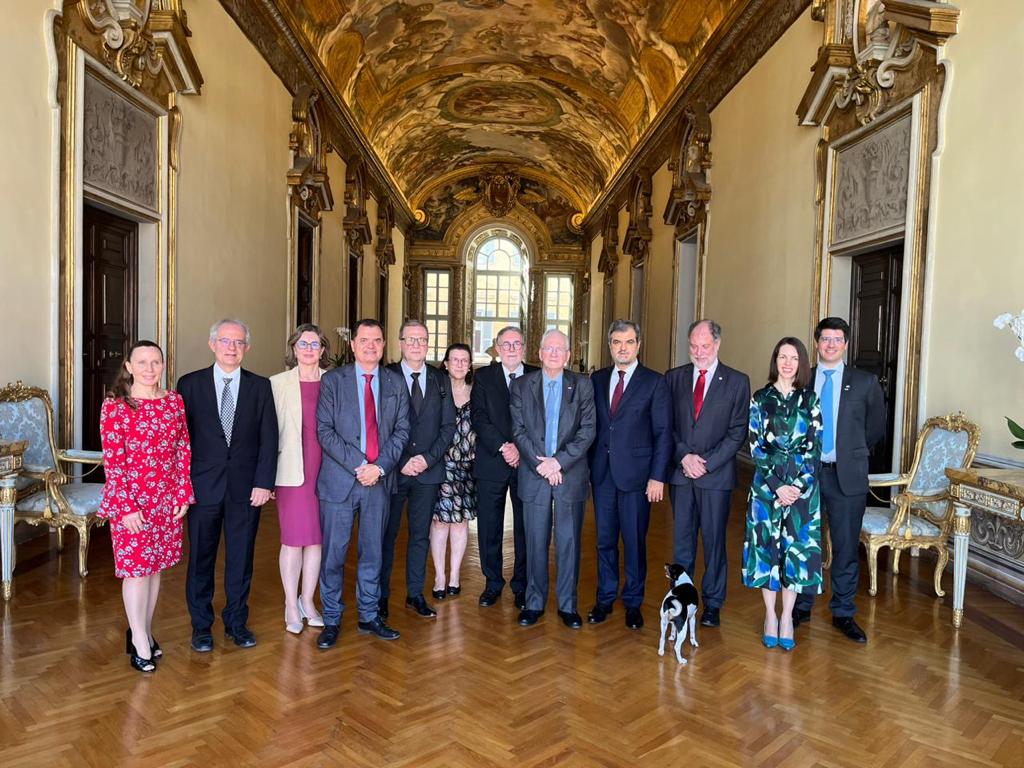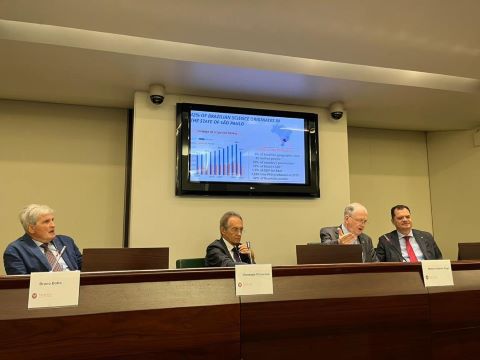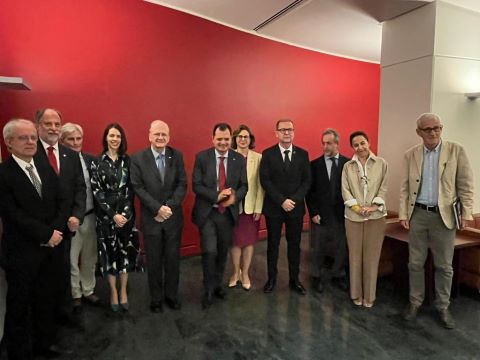


Representatives of FAPESP, USP, UNESP and UNICAMP visited the Brazilian Embassy in Rome, Italy, in October.
Published on 11/27/2023
By Elton Alisson | Agência FAPESP – Senior executives of FAPESP visited several scientific institutions in Italy in October to increase scientific collaboration between researchers there and in São Paulo state. The delegation consisted of Marco Antonio Zago, President of FAPESP, and Carlos Américo Pacheco, its Chief Executive Officer, as well as representatives of the University of São Paulo (USP), São Paulo State University (UNESP) and the State University of Campinas (UNICAMP).
One of the institutions they visited was the World Academy of Sciences (TWAS) in Trieste. As a program unit of the United Nations Organization for Education, Science and Culture (UNESCO), TWAS works to support sustainable prosperity in developing countries through research, education, policy and diplomacy.
During the meeting, representatives of FAPESP and TWAS signed a memorandum of understanding that assures the awarding of 35 fellowships annually for researchers in developing countries to conduct research in São Paulo state. Twenty will be reserved for postdocs and 15 for PhD candidates.
“TWAS can play a crucial role in creating and maintaining collaborations between researchers and research institutions in São Paulo state and the developing world. Our cooperation with these regions will grow and become stronger through this partnership,” Zago said.
The research will be conducted at host institutions in São Paulo state, and the fellowships will last between six and 24 months, in the case of postdocs, and up to four years for PhDs. In addition, FAPESP and TWAS will offer up to five grants per year for young principal investigators in these countries to set up scientific laboratories at host institutions in São Paulo state and staff them with student researchers to work on their projects.
“World-class research takes place in São Paulo, and I am sure researchers from less developed countries who spend time working there will greatly benefit from its lively scientific community and interdisciplinary outlook,” said Romain Murenzi, Executive Director of TWAS, in a press release posted by the organization.
Advances in physics in South America
Also in Trieste, the Brazilian delegation visited the International Center for Theoretical Physics (ICTP), where representatives of ICTP and UNESP renewed an agreement to support ICTP’s partner institution in Brazil, the ICTP-South American Institute for Fundamental Research (ICTP-SAIFR).
Created in 2010 with FAPESP’s support and hosted by the Institute of Theoretical Physics on UNESP’s Barra Funda campus in São Paulo city, ICTP-SAIFR fosters the advancement of basic sciences in South American countries. It was the first center created by ICTP outside Italy and was followed by others in Africa, Central America and, more recently, China.
The new agreement recognizes the success of the institute’s theoretical physics research and training, which has helped ICTP-SAIFR become a center of excellence in South America. With the support of funding agencies such as FAPESP, Simons Foundation and Serrapilheira Institute, ICTP-SAIFR organizes dozens of schools and workshops each year for graduate students and researchers, as well as outreach activities for high-school students and teachers and the general public.
“The aim of ICTP-SAIFR is to operate as a hub for researchers and graduate students from Brazil and other South American countries to visit and participate in the events we organize. Some 30% of the participants in schools funded by FAPESP come from other South American countries,” Nathan Berkovits, Director of ICTP-SAIFR, told Agência FAPESP.
The institution’s board includes representatives of UNESP, ICTP, FAPESP, Serrapilheira and the Brazilian Academy of Sciences (ABC), and its scientific committee includes ten renowned physicists.
The American Physical Society recognized ICTP-SAIFR’s contribution to the development of physics in South America by giving Berkovits the 2021 John Wheatley Award. Its 2020 Innovation Award went to the institution’s high-school teacher training program.
“This successful collaboration has not only raised the level of physics research in South America, but has also helped IFT-UNESP to be the best department of theoretical physics in Brazil. It attracts the best graduate students to its master’s and PhD programs, and attracts the best researchers to its faculty,” Berkovitz said.
ICTP-SAIFR’s faculty members include Pedro Vieira, a professor at Canada’s Perimeter Institute, and winner of the 2018 Sackler Physics Prize and the 2020 New Horizons in Physics Prize for his research in quantum field theory; and Riccardo Sturani, a member of the LIGO-Virgo collaboration that was awarded the 2017 Nobel Prize in Physics for the detection of gravitational waves.
Besides research in fundamental physics, researchers affiliated with ICTP-SAIFR have applied their knowledge of the field in other areas, such as quantitative biology, ecology and computer science.
“ICTP-SAIFR has successfully recreated the ICTP model of science and training excellence, helping to build a strong scientific community in South America,” said ICTP Director Atish Dabholkar in a press release posted by ICTP.
Other agreements with Italian institutions
The Brazilian delegation also visited science, technology and innovation institutions in Rome, Bologna and Milan. In Rome, representatives of FAPESP and Italy’s National Research Council (CNR) renewed a scientific and technological agreement originally signed in July 2014 to strengthen cooperation in areas of interest to both countries and achieve internationally important results that promote technological innovation and socioeconomic development.

Visit to the University of Bologna.
Two calls have so far been issued under the agreement, for research proposals involving collaboration between scientists at institutions in São Paulo state and Italy in agriculture, biodiversity, engineering, physics and genetic medicine.
The FAPESP delegation also met with representatives of Italy’s three leading universities, which have complementary research interests and cover all knowledge areas: the University of Bologna, the oldest in Italy; the Sapienza University of Rome, one of the world’s largest universities in terms of student numbers; and the Polytechnic University of Milan.

The Brazilian delegation visiting the Sapienza University of Rome.
The delegation also visited the Human Technopole, a new international research institution located in the Milan Innovation District (MIND). It focuses on the life sciences and human biology with the mission of improving human health and well-being. One of its goals is to increase public and private investment in research and development in the areas involved.
150 years of Italian immigration to Brazil
The Brazilian Embassy accompanied and gave full support to FAPESP’s representatives throughout their stay in Italy. “I was delighted to welcome the delegation from FAPESP, USP, UNESP and UNICAMP to the embassy in Rome. They came here to strengthen the academic and research ties with Italian institutions,” Ambassador Renato Mosca wrote to Agência FAPESP. “Cooperation between Brazil and Italy in science and technology is displaying growing vitality. São Paulo state has cutting-edge universities and research centers, as well as a dynamic private sector, all of which contribute significantly to relations with Italy in the field of science and innovation.”
Fabio Porta (Democratic Party), a member of the Chamber of Deputies (the lower house of Italy’s parliament), also accompanied the Brazilian delegation. “The visit to Italy by the leaders of FAPESP and representatives of some of the main universities in São Paulo state was extraordinarily successful from the institutional and scientific standpoints. It took place at a particularly favorable time for Italo-Brazilian relations because we’re about to commemorate 150 years of Italian immigration to Brazil [which began in 1875].
“The mission was also useful and timely for the purpose of planning concrete initiatives to be organized next year to showcase the positive results of this century and a half of Italian presence in Brazil, in cooperation with local authorities in the scientific and institutional spheres,” he said.
Source: https://agencia.fapesp.br/50315